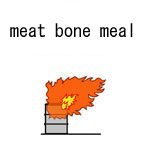| Case Name |
Spontaneous ignition of meat and bone meal under storage caused due to fermentation with rain water |
| Pictograph |

|
| Date |
December 3, 2001 |
| Place |
Kagoshima, Kagoshima, Japan |
| Location |
Warehouse |
| Overview |
A fire occurred in a warehouse where a large amount of MBM was stored for a long time. MBM was fermented with rain water and ignited due to heat accumulation. Attacks of BSE still continue, but the peak of the fire hazard with storing MBM had passed. |
| Incident |
During long-term storage, meat and bone meal generated heat by fermentation and a large amount of heat was also accumulated, leading to ignition and a fire. The warehouse also caught fire. The mass and long-term storage resulted from prohibition of MBM use in Japan due to BSE trouble. |
| Processing |
Storage |
| Substance |
Meat and bone meal (MBM) |
| Type of Accident |
Fire |
| Sequence |
MBM in 1000 bags (capacity: 500 kg-1 ton) made of knitted synthetic resin were stored in a warehouse for three months. An employee, who went to the warehouse in the early morning, saw red flames through the window and white smoke was filling the warehouse. He informed a firefighting station of the fire. |
| Cause |
There was a crack in the roof, and it had rained a few days before. A large quantity of stored MBM got wet with water and fermented. There were some effects of mass storage, heat accumulated over a long period, and there was spontaneous ignition. |
| Response |
Fire was extinguished by a public fire brigade. The employees of the warehouse were absent at the time of the fire. |
| Countermeasures |
As MBM ferments in contact with water, it is a very important not to let it get wet when it is stored in a warehouse. Concretely, it is important to prevent leakage of water through the roof and to do adequate patrol. Patrols should pay attention to a smell, because an offensive odor is emitted when fermentation occurs. |
| Knowledge Comment |
Fermentation occurs readily when there is appropriate moisture in refuse including MBM, and it generates heat. Heat is accumulated easily if there is a large quantity even if the exothermic reaction is very small and increases gradually, leading to spontaneous ignition. It is equivalent to spontaneous ignition of oily rags. Therefore, it is necessary to pay sufficient attention to temperature control and prevent rain water from entering on storing a large amount. Reactivity of MBM is high just after it is manufactured because the temperature is high, so MBM should be stored after cooling. |
| Background |
A large quantity of stored MBM gradually oxidized and fermented due to contact with water. MBM accumulated fermentation heat, reached a high temperature, and ignited spontaneously, resulting in a fire. Sufficient management might not have been performed without understanding that fermentation could occur easily and heat accumulates in a mass storage. |
| Sequel |
The case is under a civil trial. The building structure was a problem. The warehouse had been used for another purpose. National Research Institute of Fire and Disaster did various tests to find the cause of the fire in January, 2003. |
| Reason for Adding to DB |
Example of spontaneous ignition caused due to mass storage of meat and bone meal from BSE trouble |
| Scenario |
| Primary Scenario
|
Poor Value Perception, Poor Safety Awareness, Inadequate Risk Recognition, Ignorance, Insufficient Knowledge, Insuficient Study and Experience, Planning and Design, Poor Planning, Secondhand Use Planning, Bad Event, Chemical Phenomenon, Heat Generation, Secondary Damage, External Damage, Fire, Loss to Organization, Economic Loss, Warehouse Burnt etc.
|
|
| Sources |
Yusaku Iwata, Hearing and investigation on fire generated in storage area of MBM in Kagoshima Prefecture (2002).
|
| Physical Damage |
Meat and bone meal in a warehouse were partially destroyed by fire. A steel-frame cold store was damaged. |
| Notes |
The fire occurred with spontaneous ignition caused by fermentation of MBM. There was no environmental effect except for the offensive odor of MBM. |
| Field |
Chemicals and Plants
|
| Author |
KOSEKI, Hirosi (National Research Institute of Fire and Disaster)
YOSHINAGA, Jun (Graduate School of New Frontier Sciences, The University of Tokyo)
TAMURA, Masamitsu (Center for Risk Management and Safety Sciences, Yokohama National University)
|